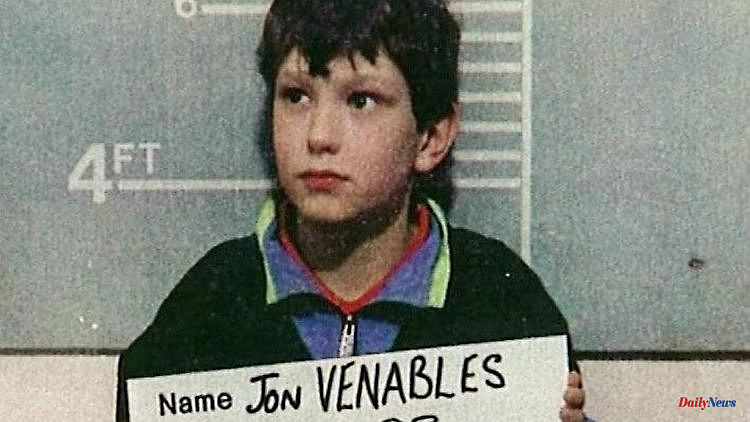In 1993, two-year-old James Bulger was kidnapped from a British shopping mall. A little later, the authorities found the boy's body, abused and cut in half, and arrested the just ten-year-old perpetrators. The case goes around the world and is still remembered 30 years later.
The images from the surveillance cameras went around the world 30 years ago. Two ten-year-olds lead a two-year-old boy by the hand through a shopping center in the English city of Liverpool on February 12, 1993. What looks friendly is actually a kidnapping that ends in the gruesome death of little James Bulger. Abused and killed by two children.
His mother had only let him go briefly to pay at a butcher's shop. The search ends with a grisly find. Covered with wounds, cut in half by a train, the small body lies on a platform where the perpetrators had led it before killing it with punches, kicks, brick throws and a metal bar.
It doesn't take long before two suspects come into their sights: Robert Thompson and Jon Venables, two notorious truants and shoplifters. The mugshots, known in England as "mugshots," would look almost like school photos if the two ten-year-old boys weren't holding tablets with their dates in their hands. In many countries around the world - including Germany - they would have been too young to be prosecuted at all. But in England, the age of criminal responsibility is ten years.
The gruesome murder shakes the country. A lynch mob gathers outside Liverpool courthouse, clamoring for the accused to be extradited. Violent scenes ensue. The country's tabloids outdo each other with headlines like "Evil! Pure Evil!" or "freaks of nature". A newspaper headlines with the quote that one of the boys was "possessed by the devil".
On the other hand, the circumstances from which the two neglected children come are of little interest. Until the four-week trial, the boys will only be referred to in public as Child A and Child B. But with the verdict, the judge lifts the anonymity of the two. They and their families will later be given new identities to keep them safe from attack.
The European Court of Human Rights later awarded them compensation for the proceedings. The judge recommends eight years in prison. But James Bulger's family is collecting more than a quarter million signatures for a commutation to life imprisonment. The tabloid "The Sun" is also drumming for it. Michael Howard, Home Secretary in Prime Minister Tony Blair's government, steps in. He increased the sentence to 15 years. However, an appeals court overturned the decision. Ultimately, the sentence is set at seven years and eight months. The two boys are taken to closed children's homes. James Bulger's family feel abandoned.
In June 2001, Thompson and Venables were released on probation for the rest of their lives. While Thompson manages to stay out of trouble with justice, Venables faces multiple adult convictions for possession of child pornography and similar offenses. He is also in prison 30 years after the murder of James Bulger.
Andrew Neilson of the Howard League for Penal Reform, which advocates for reforms in the English justice system, which is heavily geared towards retaliation and punishment, sees the James Bulger case as a turning point. "I think public opinion about very young delinquent children hardened dramatically at the time," he says in an interview with the dpa. Part of that may have been due to the footage from the surveillance cameras, which made the kidnapping visible to the entire nation. In any case, he sees the Bulger case as the crystallization point of a development that led to harsher and longer prison sentences and to a doubling of the number of inmates in English prisons.
Neilson is not hoping for an increase in the age of criminal responsibility. In view of public opinion, neither of the two major parties could afford that. Nevertheless, he sees progress in the recent past. The police and judges are increasingly opting for rehabilitation instead of punishment. According to Neilson, the number of minors in prisons has fallen sharply. In 2007 there were around 3,000, but now there are only around 430 underage prisoners.
Neilson is less positive about the development of the question of naming the accused and those convicted. In England it is customary for the name of alleged perpetrators to be made public as soon as the police make an initial charge. The press often urges doing the same for minors - which Neilson says is happening more and more often.
James Bulger's mother, Denise Fergus, has continued to feature in the media. She recently published a revised version of her book I let him go. She is far from seeing the end of her campaign to put the perpetrators behind bars for the rest of their lives. "To everyone who says I should let it go, why should I let it go? (...) I will never stop," said Fergus in a documentary on the 30th anniversary of the murder on British broadcaster Channel 5. It was only reported in mid-January she in the press from a meeting with Justice Secretary Dominic Raab. He promised her that Venables "will never see the light of day again" as a result of the government's planned judicial reforms, Fergus said.












